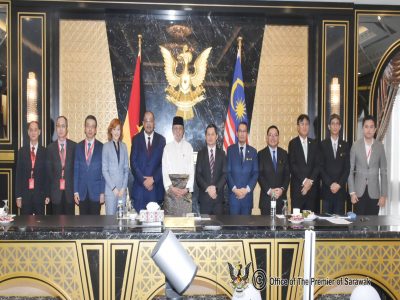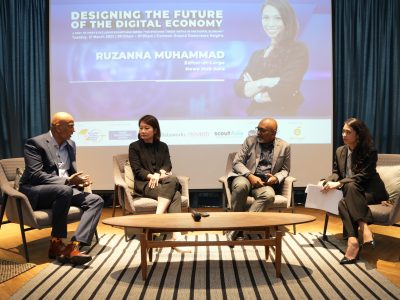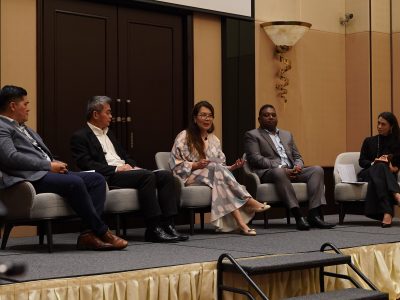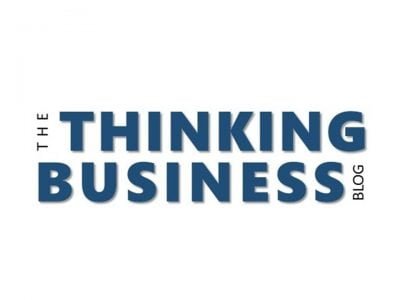Every sector is embracing this change, even legal – why?
by Gunapasath Bupalan (an exclusive with MahWengKwai & Associates)

In the last 18 months, businesses around the world have been forced to adapt their business models and adopt the use of digital technology to continue reaching their clients and customers. Organisations that have not been able to evolve quickly enough have found themselves floundering in the post-Covid world – where going digital may make all the difference to whether a business dies, survives or thrives.
According to Mei Lum, who is the co-founder and principal consultant of MWKA Technologies, many business owners fail to understand that digital transformation is a “people-centric” process optimisation opportunity, and not merely an upgrading of IT systems.

Mei Lum, co-founder and principal consultant of MWKA Technologies
“Understanding this correctly is the first step towards a healthy digitalisation process – one that is necessary in keeping businesses afloat amidst the pandemic, and help them thrive in the long run,” she says.
As the Covid-19 pandemic continues, business models and processes of larger companies and small-medium enterprises (SME) alike may continue to change to include automation and flexible working arrangements. Many businesses from various sectors might have the intention to digitalise but lack the know-how on the necessary steps of digitisation, or the ability to manage the change management process, or fear that they may not be able to afford such a transformation.
“I truly believe that every business and every industry, no matter how archaic or traditional they may appear at first blush, can embrace a digital transformation and experience significant growth from the success that comes with it. Whilst a clear vision of what the transformation should achieve is paramount, the hardest step may be to accept that change – and getting the right support, buy-in and collaboration is essential,” explains Mei, who is also an FCCA & SAFe Program Consultant.
The legal industry has had to embrace this change as well.
Raymond Mah, Managing Partner of MahWengKwai & Associates, says his law firm began its digital transformation journey to be more client-centric almost 10 years ago.

Raymond Mah, Managing Partner of MahWengKwai & Associates
“Our digital transformation involved developing the legal services needed to support the implementation of new technologies by clients. Data privacy and cybersecurity are issues that all businesses undergoing a digital transformation need to address, both in terms of technology as well as from a legal perspective. While it may not be impossible to completely eliminate the risk of data breaches or cyber-attacks, or even changes in government regulation, it is important to seek advice on how to prudently identify, manage and mitigate legal risks,” Raymond says.
He adds that the process also involved adopting cutting-edge software as a service (SaaS) solutions and moving away from the traditional desktop based computing that had been the mainstay of lawyers for so many years. Today, all of his team members, including clerks, use laptops for complete mobility.
“Our successful digitalisation had more to do with developing a team with an agile mindset and new skills than just new hardware or data-driven insights. Our agile coach and CTO from MWKA Technologies has been instrumental in charting our cohesive tech strategy and working with our people to constantly challenge themselves to find innovative ways of doing things better.
“In order to meet our objective of providing clients with quality legal services in a manner that is both consistent and reliable, we identified the need to have in place technology that allowed us to work securely, collaboratively and remotely when necessary,” Raymond explains.
MWKA Technologies is the technology research and development arm of MahWengKwai & Associates.
According to leading global market research firm, Forrester, Covid-19 has accelerated digital transformation initiatives in some 34% of firms (across various key industries and sectors) in Malaysia. Interestingly, of those currently driving a transformation effort, more than half say that they have increased their spending on digital transformation in 2020 – despite the economic crisis.
The financial services, retail industries, and even healthcare, have had to adopt digitisation and digital transformation for the betterment of their customers, clients, responders and employees.

Malaysian Director-General of Health, Datuk Dr Noor Hisham Abdullah – the need of transforming the current healthcare system from one of complexity to one of high impact is timely and significant
Given the ongoing Covid-19 pandemic, the recent comment from the Director-General of Health, Datuk Dr Noor Hisham Abdullah, on the need of transforming the current healthcare system from one of complexity to one of high impact, along with reasonable cost and excellent outcomes, is timely and significant. This transformation is vital to support Malaysia’s transition towards Malaysia 5.0, a vision propounded by Datuk Dr Rais Hussin, Chairman of Malaysia Digital Economy Corporation (MDEC) – by introducing and applying the innovations of the Fourth Industrial Revolution that incorporate both the physical and digital worlds.
But what does digital transformation mean for employees and the workforce?
Employment lawyer, Diana Cheak, says business owners should not use digital technology as an excuse to automatically ‘validate’ the reduction of headcount.
“To a certain extent, digitalisation and automation may inevitably result in redundancy, causing employers to retrench their employees, but retrenchment should always be the last option. Other less invasive cost cutting measures should be considered first.

Diana Cheak, Senior Associate of MahWengKwai & Associates
“For instance, employers may consider engaging their employees in upskilling and reskilling courses to unlock or develop new talents and skills. Upskilling and reskilling may create new business opportunities for employers, retain specialist knowledge, whilst helping employees stay employed through these trying times. When retrenchment is unavoidable, employers should comply with the rules and requirements applicable to a lawful retrenchment exercise. Any flaws in the retrenchment process may result in an unfair dismissal suit being initiated by the employee against the company,” says Diana, who is a Senior Associate of MahWengKwai & Associates.
If you would like to understand better on how to remove unnecessary friction in your digital transformation journey, please visit MWKA Technologies, or if you need assistance in managing employment matters, please visit MahWengKwai & Associates.
Services
Stakeholder mapping, analysis, engagement and communication needs to be detailed to avoid business losses or even worse, a crisis. How can you do this effectively to prevent failure? ...
Data-driven business decisions have never been as crucial, especially in this era. MGBF leverages off, technology, experience and market presence to aid businesses in making accurate decisions. ...
MGBF provides comprehensive strategic advice and results-focused solutions to solve clients' problems in business-government relations so they can focus on their core business. ...
A critical business challenge is meeting the right decision-makers and potential buyers through the best channel and platform. How will you improve your business competency? ...
Upcoming Events
MGBF founding chairman Nordin Abdullah and UMW Toyota president Datuk Ravindran K. will delve into the convergence of automotive innovation and environmental sustainability in Penang, Sarawak, Johor and Pahang.
Hosted by menumiz™ – an end-to-end restaurant management system – this roundtable will feature a case study presentation and a panel session to discuss the latest digital trends, challenges, and opportunities within the food and beverage sector.
In this episode of 'A Working Lunch with Nordin', MGBF's founding chairman, Nordin Abdullah, will host this discussion focusing on the biggest threats and opportunities for businesses as we look to manage change in the South China Sea.
This MGBF Roundtable will focus on regional food security issues and trends in the regional supply chain, and trade regulations and policies, including a new geopolitical tool i.e., weaponisation of supply chains.
MGBF In The News

Planet QEOS, KIS BlOCNG San Bhd, and the Sarawak Land Consolidation and Rehabilitation Authority (SALCRA) have officially signed a tripartite memorandum of understanding (MoU) to establish a collaborative framework aimed at producing bio-hydrogen via the Steam Biomethane Reforming (SBMR) Process. The MoU was signed by Planet QEOS executive chairman Dino […]

Planet QEOS and China Machinery Engineering Corporation (CMEC) are interested in investing RM10 billion to co-develop advanced Megawatt peak (MWp) agrovoltaic in Baram, to further boost Sarawak’s green energy initiative and food security. Sarawak Premier Datuk Patinggi Tan Sri Abang Johari Tun Openg was briefed on Friday by both the […]

Last week SPM results came out, 373,974 aspirants who have been waiting patiently over the last few months would now know their fate. Some 10,109 have received all A’s, the golden standard of academic success and the ticket to those looking to study the “more advanced” subjects in university. Proudly, […]

The classic knee-jerk reaction is to say, fire the coach, change the leadership of associations, and reduce the funding till they start performing better. This kind of negative reinforcement may work for kindergarten children, but we are dealing with high-performance adults – individuals much further along in their psychological and […]

Since its earliest tea plantations in 1929, Cameron Highlands has grown to become a key player in the agricultural landscape of Malaysia, producing 40 per cent of all vegetables grown. Despite Malaysia shifting its economic focus away from agriculture, the industry remains imperative for food security and the livelihoods of […]

Although at first glance the travel industry and the agricultural sector appear to have nothing in common, they actually share more than meets the eye. The economic benefits of tourism to the agricultural sector can be multiplied several times over. “Tourism brings the end consumers closer to the source, which […]

The Malaysia Global Business Forum (MGBF) recently held a high-level roundtable themed ‘Designing the Future of the Digital Economy’, attended by industry leaders and business associations. The guest of honour was Yang Berhormat Syerleena Abdul Rashid, the Member of Parliament (MP) for Bukit Bendera in Penang. The MP’s Special Session […]

The Malaysia Global Business Forum (MGBF) will be hosting a roundtable on ‘Designing the Future of the Digital Economy’ on 23 February 2023. It is the culmination of the first three MGBF Exclusive Roundtable Series titled ‘The Evolving Threat Matrix in the Digital Economy’ held throughout 2022. According to the […]

The Founding Chairman of the Malaysia Global Business Forum (MGBF), Nordin Abdullah, today spoke on Bernama TV’s leading English talk show, The Brief, hosted by Jessy Chahal, on the topic of a stable political reality and what that means for the Malaysian economy. Nordin said, “The first thing that it […]

More than 1,100 years ago, Muhammad ibn Musa al-Khwarizmi was developing the mathematical formulas that we know today as algorithms which now have become so intertwined with the business fortunes of global media giants and the very fabric of geopolitics. A series of recent high level international reports have revealed […]

KSK Land has been recognised by the Malaysia Global Business Forum (MGBF) for its role in attracting high net-worth individuals to Malaysia post-pandemic. The first challenge in investor attraction is “selling” the country. In the context of Asia, Malaysia is competing with some very established investment destinations. The second […]

Malaysia, in particular Kuala Lumpur, continues to position itself as a regional centre to do business, educate a family and enjoy a global lifestyle. One company, KSK Land, has taken the lead in positioning itself and the city of Kuala Lumpur as a property investment destination for the global citizen […]

The upcoming budget represents an opportunity to build resilience in the critical sectors that will form the backbone of the country’s future-facing economic ambitions. This however needs to be achieved in the context of managing the community sectors most impacted by COVID-19 over the past two years. The Keluarga Malaysia (Malaysian Family) […]

Malaysia Global Business Forum (MGBF) has moved to support the creative economy as the overall economy moves into a recovery phase following the COVID19 pandemic. As a step in the direction of normalcy, the MGBF has agreed to host the art exhibition “I Know You’re Somewhere So Far” by one […]

Congratulations to Datuk Seri Ismail Sabri Yaakob for taking up the mantle of the ninth prime minister of Malaysia. There is nothing normal about the situation; it could not have been scripted but it has kept the spectrum of media, mainstream and social, gripped. The first order of business for […]

In a stirring speech to the nation, President Joseph R. Biden, Jr. stamped his brand of leadership on the presidency, in his first act as the 46th president of the United State of America, it signaled several shifts. Perhaps the weather was foreboding with snow falling before the ceremony that […]

KUALA LUMPUR, 6 July 2022 – As the global economy continues to deal with unprecedented levels of disruption caused by the pandemic and the conflict between Russia and Ukraine, the convergence of energy security and food security issues has become a front-of-mind issue faced by policy makers and consumers alike. […]

KUALA LUMPUR, 23 June 2022 — Malaysia Global Business Forum (MGBF) ties up with scoutAsia to ensure that businesses are equipped with deeper regional insights. The past two years has seen a massive shift in the way businesses are conducted with digitisation, digitalisation and automation continuously being adopted to improve […]

KUALA LUMPUR, 25 May 2022 – The Malaysia Global Business Forum (MGBF)’s exclusive roundtable on ‘Security Concerns in Critical Value Chains’ was held in a hybrid setting yesterday at the Eastin Hotel Kuala Lumpur. The guest of honour was Yang Berbahagia Tan Sri Dato’ Seri Rafidah Aziz, former minister of […]







































